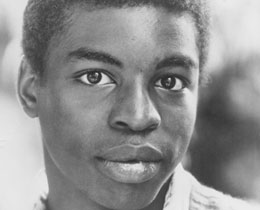 The toughest role to cast in the hit miniseries “Roots” was the central character of Kunta Kinte. The whole series depended on finding a young, fit actor who could credibly portray a man captured into slavery as a youth. LeVar Burton was a sophomore in theater school at USC and had no previous experience in front of the camera when he won the role. Early in the production he faced one of the more challenging scenes, Kunta Kinte’s enslavement in Africa. “The sequence cut together is just brilliant because in sort of a montage of imagery, you see this wild stallion being subdued. It’s beautiful and terrifying all at the same time,” says Burton today.
The toughest role to cast in the hit miniseries “Roots” was the central character of Kunta Kinte. The whole series depended on finding a young, fit actor who could credibly portray a man captured into slavery as a youth. LeVar Burton was a sophomore in theater school at USC and had no previous experience in front of the camera when he won the role. Early in the production he faced one of the more challenging scenes, Kunta Kinte’s enslavement in Africa. “The sequence cut together is just brilliant because in sort of a montage of imagery, you see this wild stallion being subdued. It’s beautiful and terrifying all at the same time,” says Burton today.
The most difficult scene for Burton to shoot was one in which Kunta Kinte is brutally whipped. The graphic scene had to be shot twice because it was too daunting for Burton. “I just could not relax enough to be in the scene,” Burton said. The character of Fiddler, played by Louis Gossett, Jr., comforts Kunta Kinte after the whipping. “I think of all of the moments in the series, that’s my favorite,” said Burton. “It’s all Fiddler, and Louis is absolutely transcendent in that moment. The compassion that just comes pouring out of that man,” Burton exclaimed.
Burton had to be reminded that racism was still prevalent in America while he was filming “Roots” in Georgia. Burton went out to a bar one night and danced with a white woman. Alex Haley, the author of “Roots,” pulled him aside and said, “Let me just remind you that even though this is 1976, there are still prevailing attitudes in certain parts of this country where that kind of behavior is not looked favorably on.”
“Roots” Opens America’s Eyes
Before “Roots,” most people’s knowledge of slavery and the history of African-Americans in the United States was limited to a paragraph or two in a textbook. “[Roots] served as a vehicle of enlightenment and empowerment” Burton said, “It is the absolute best use of moving pictures and sound that we can achieve.” “Roots” was the first time this kind of information was being relayed on a wide scale to a large audience. It served as a lesson that left an impact on everyone, and gave African-Americans a sense of pride.














































